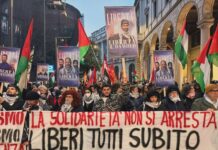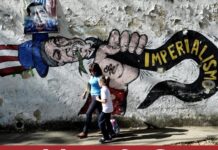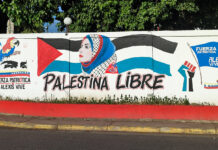
Palestinian prisoners’ institutions released their monthly report on Palestinian prisoners and detainees of the Israeli occupation for August 2017. The Palestinian Prisoners’ Society, Al-Mezan Center for Human Rights, Addameer Prisoner Support and Human Rights Association and the Prisoners’ Affairs Commission compiled the report below. Translation by Samidoun Palestinian Prisoner Solidarity Network.
In August 2017, Israeli occupation forces continued their policy of arbitrary detention against hundreds of civilians in the occupied Palestinian territory and their ongoing practices which violate international humanitarian and human rights law.
Arrest Statistics
In August 2017, 522 Palestinians were arrested by Israeli occupation forces, including 130 children and 16 women.
According to the documentation of the prisoner support organizations, 194 Palestinians were arrested from Jerusalem, 70 from al-Khalil, 50 from Ramallah, 45 from Nablus, 38 from Bethlehem, 33 from Jenin, 27 from Tulkarem, 24 from Qalqilya, 19 from Salfit, 11 from Jericho, seven from Tubas and four from the Gaza Strip.
The total number of Palestinian prisoners in Israeli jails reached 6300 prisoners, 64 of whom are women. Among them are 10 minor girls and 300 boys, 450 administrative detainees imprisoned without charge or trial and 12 detained members of the Palestinian Legislative Council.
134 administrative detention orders were issued in August for imprisonment of Palestinians without charge or trial; 61 were new orders and 73 were renewal orders, as administrative detention orders are indefinitely renewable.
The Arrest of Human Rights Defenders
Article 1 of the Declaration on the Protection of Human Rights Defenders was approved by the General Assembly of the United Nations in 1998, providing that: “Everyone has the right, individually and in association with others, to promote and to strive for the protection and realization of human rights and fundamental freedoms at the national and international levels.” Despite this, the occupation continues to arrest and prosecute activists and human rights defenders.
On 23 August, Israeli occupation forces arrested a human rights defender, Salah Hamouri, a field researcher for Addameer Prisoner Support and Human Rights Association, after invading his home in the town of Kufr Aqab north of Jerusalem, ransacking it. Hamouri has been arrested more than once. He was sentenced to nearly seven years in prison in a plea bargain but was released in the Wafa al-Ahrar prisoner exchange in 2011. A few days after his arrest, he was initially released on several conditions:
1) House imprisonment in the village of Reineh in occupied Palestine ’48 for 20 days
2) Travel ban for 3 months
3) Expulsion from the city of Jerusalem for 90 days
4) Paying a bail of 10,000 NIS ($3,800 USD)
However, before he was to be released, he was instead issued a 6-month administrative detention order. When brought before the court for confirmation, he was instead sentenced to return to the remainder of his prison sentence from which he was released in 2011, approximately 3 months. The prosecution appealed this sentence, and his 6-month administrative detention order was reimposed.
The arrest of Hamouri is an example of the arbitrary detention targeting human rights defenders and human rights activists for imprisonment, with the goal of preventing them from playing their role in the community in raising awareness and defending the rights and freedoms of the people. It is notewirthy that Hamouri was arrested more than once, during which he was subjected to various forms of torture and ill-treatment, most recently in 2004, after which he was imprisoned for nearly 7 years before being released in the 2011 Wafa al-Ahrar agreement. During his detention in 2004, he was offered a plea bargain by the Israeli occupation authorities to deport him to France for 10 years, since he is a French citizen, instead of sentencing him, but he refused the offer and stayed in Palestine. After he was released, he was subjected to several arbitrary practices by the Israeli occupation forces. He was issued an order preventing him from entering the West Bank twice, and the period of his prohibition was a year and a half. In 2016, Israeli occupation officials deported his pregnant wife Elsa, a French citizen, and banned her from Palestine for 10 years, with their child, Hassan, who she is forced to raise away from his father. Finally, all of his requests for the right to family reunification have been refused as an arbitrary punitive measure against Salah and his family.
Extrajudicial Killings: The Case of the Martyr Raed al-Salhi from Dheisheh Camp
The policy of field executions and shooting to kill is not a surprising action committed by individuals, but is instead a deliberate and systematic policy approve at the highest levels of the occupying power. Statements made by the government officials of the occupation state in the media or directly in proposals from members of the government emphasized the need to reduce the legal requirements for the use of live ammunition against Palestinians, to the extent that it constitutes a breach of international law.
Since September 2015, human rights organizations have been monitoring and documenting cases in which occupation forces engaged in extrajudicial executions of Palestinian civilians, by shooting at the upper body with intent to kill (areas between the head and abdomen) during demonstrations and confrontations that broke out in most of the occupied Palestinian territories.
The occupation did not hesitate to use this method even during the implementation of its arrest raids and invasions carried out by the army in Palestinian camps, villages and cities. On 9 August 2017, in the early hours of the morning, the Israeli occupation forces invaded the Dheisheh refugee camp, east of Bethlehem city, in order to carry out a campaign of arrestts of youth in the camp.
Occupation forces opened fire at point-blank range on the young Abdel-Aziz Arafa, who was wounded in the left leg by live ammunition, and Raed Salhi, who was critically wounded after being shot six times during his arrest. He was martyred on 3 September 2017 as a result of his injuries. He was directly wounded in the liver and kidney by live ammunition, and through field testimony collected from the families of the youths and others, it was confirmed that the army deliberately fired live ammunition at him, carrying out a field execution.
The prisoner, Bassam al-Salhi, the brother of Raed Salhi, said:
“On 9 August 2017 at 3:43 am, I was woken from my sleep by my mother’s voice screaming and crying, saying that the army is killing people and that they fired inside the house specifically. When I got up I went out to the living room and my mother was crying and screming. She told me that Raed is martyred, that he is wounded and is behind the wall behind our house. I was with my younger brother Mohammed and we went to try to save Raed, going out the door leading to the back wall. I jumped on the balcony to try to get to the back wall, because our houses in the camp are close together. And the occupation forces opened fire on the railings of our neighbors, the soldiers firing heavily. Then I saw a soldier lying on the railings of our home and it looked to me as if he was wounded. I later learned that the soldiers who fired at Raed hit the soldier, and all the soldiers concentrated on evacuating the wounded soldier. I thought I would take advantage of their preoccupation and jumped to the house of the other neighbors, where Raed was lying on the ground near their house, just behind ours. I saw Raed, who was lying on the ground and trying to walk and losing a lot of blood, and I approached him and extended my hand for him to take, but at this moment, one of the Israeli soldiers caught Raed in his laser sight. I dragged him by the hands quickly and his left leg was bleeding. He had a bullet in his leg and he was full of blood, we moved away from the place between the houses until we were settled away from our besieged neighborhood full of soldiers. Throughout this time, Raed was bleeding in large amounts and speaking to me about many things, as if he were dying. He was starting to spit up blood and after about 15 minutes a number of soldiers stormed the place, following the trail of blood. During this time, one of the soldiers asked me to move away from him but I refused, and then a soldier attack me. Another pulled out his gun and fired to frighten me but I did not move. Then the same soldier hit me on my right shoulder and leg and pushed me away by force from Raed. They took him away from me, and a soldier examined his pulse. I did not know what to do. Two soldiers then carried him by his arms and legs and I did not know where they took him after the army left the camp.”
The practice of extrajudicial executions and killings by the Israeli occupation forces is a war crime under international law, under article 8 (a)(i) of the Rome Statute. Murder is a war crime, and therefore the occupation bears full responsibility in this context of war crimes against the Palestinian people as a whole.
Arrests and Heavy Fines Imposed on Children
In August, the Israeli courts issued sentences against 39 children and imposed heavy fines on child prisoners, amounting to more than 110,000 NIS ($31,200 USD).
Human rights organizations’ monitoring and documentation showed that in the past month, 59 children were taken to the “Cubs” section of Ofer prison. Of these, 40 were arrested from their homes, 10 on the roads, 3 at the military checkpoints, 4 after being summoned to interrogation and two for lack of possession of work permits.
Four children were arrested after being shot and 13 more were injured. They were beaten and harassed during their arrest and taken to interrogation centers. Sentences issued ranged from one month to 32 months.
The Palestinian institutions consider that the imposition of excessive financial burdens on child prisoners is a major constraint on the future of the child, a form of collective punishment and a major burden amid the prevailing state of poverty, which affects and violates other human rights for themselves and their families. During the prior month, these fines reached the amount of 87,000 NIS. ($24,700 USD).
Legal Concerns
Here, the Palestinian organizations introduce the international humanitarian and human rights law on the human rights of detainees and the legal guarantees it provides, as well as Israeli violations and the legal prohibitions against such violations, as follows:
1 – Legal safeguards relating to the prohibition of arbitrary detention of Palestinian civilians. These arrests violate international human rights law, including the article 9 of the 1948 Universal Declaration of Human Rights and articles 9 and 10 of the International Covenant on Civil and Political Rights (1976).
2 – The policyof administrative detention by the occupation state, in which detention is carried out on the basis of secret evidence and without any charge against the detainee, violates internationally recognized rights to a fair trial according to the following:
a) It is contrary to Article 11 (1) of the 1948 Universal Declaration of Human Rights, which states that: “Everyone charged with a penal offence has the right to be presumed innocent until proved guilty according to law in a public trial at which he has had all the guarantees necessary for his defence.”
b) It violates articles 9 and 14 of the International Covenant on Civil and Political Rights of 1976, which guarantees everyone the right to a fair trial, to be informed of the charges against them and to be able to defend themselves.
c) The failure to disclose any charges against the person detained under the administrative detention order precludes every possibility of verifying the compliance of the occupying state with Article 78 of the Fourth Geneva Convention of 1949, which states that “If the Occupying Power considers it necessary, for imperative reasons of security, to take safety measures concerning protected persons, it may, at the most, subject them to assigned residence or to internment.” It is impossible to verify whether this detention is permitted without knowing what the reasons have been and are.
d) Not to inform the detained person of the charges against them constitutes a violation of Article 71 of the Fourth Geneva Convention of 1949, which obliges the occupying power to report charges without delay. They also constitute a violation of article 10 of the Body of Principles for the Protection of All Persons in Any Form of Detention or Imprisonment of 1988, which requires the same.
3. The killing of Raed al-Salhi by point-blank shooting is a violation of the right to life under Article 3 of the Universal Declaration of Human Rights. The practice of extrajudicial executions and killings is a war crime under international law, pursuant to article 8 (2/a/1) of the Rome Statute. Murder is a war crime, and therefore the occupation bears full responsibility in this context amid the upsurge in war crimes against the Palestinian people as a whole.
4. The detention of children violates Principle 13 of the United Nations Standard Minimum Rules for Juvenile Justice (the Beijing Rules), adopted by the General Assembly of the United Nations in 1985, which stipulated that pre-trial detention should only be used as a last resort and for the shortest possible period, as well as providing for protection and social, psychological, educational, professional and medical assistance, which are not provided by the prison administration. The Israeli judiciary imposes heavy fines on children in the framework of collective punishment, contrary to the rules of international humanitarian and human rights law.
Conclusion
This report sustains a number of findings, through our analysis of the practices of occupation authorities and the reality of Palestinian detainees in Israeli prisons, as follows:
1) The occupying forces are continuing their grave breaches and systematic violations of international humanitarian and human rights law.
2) These Israeli violations have resulted in severe suffering for Palestinian detainees in Israeli prisons.
3) The silence of the international community has encouraged the occupying power to increase their violations against Palestinian detainees.
4) The High Contracting Parties to the Geneva COnventions did not play their roles and have in fact encouraged the occupation authorities to escalate their violations.
Discover more from Samidoun: Palestinian Prisoner Solidarity Network
Subscribe to get the latest posts sent to your email.




